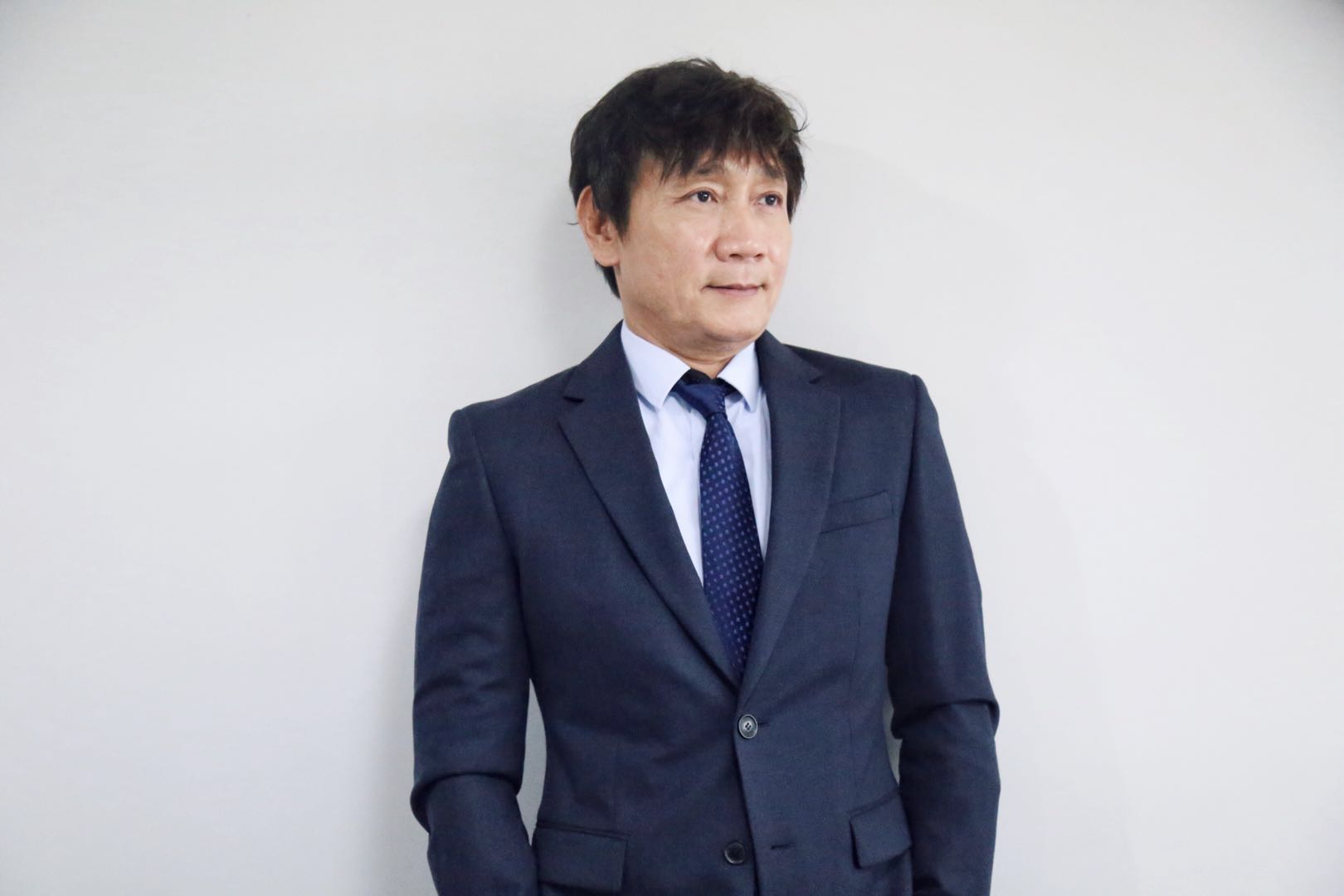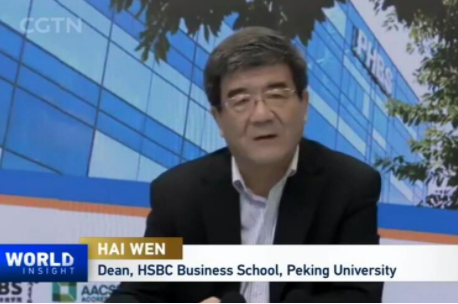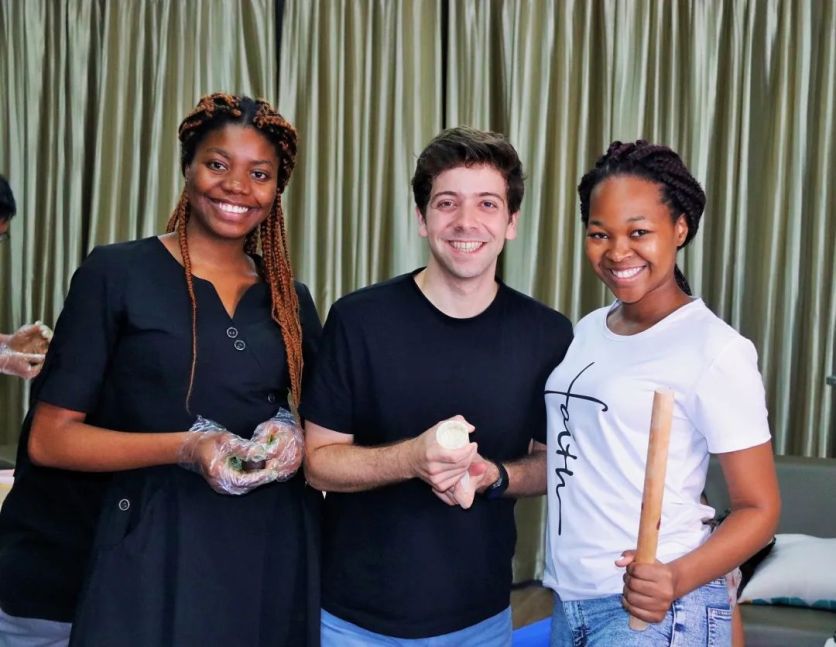For a girl who grew up in Shandong Province, going away to college in Beijing was an exciting move. Yet, Che Limei’s educational adventure would provide the chance to make a bold move: to Norway. Yet another bold move brought her back to China in 2019 where she serves as assistant professor at Peking University HSBC Business School (PHBS).
Che’s educational route began with studies in agricultural engineering at China Agricultural University and culminated with a PhD in financial economics from BI Norwegian Business School. After that she joined the faculty at the University of South-Eastern Norway, where she was associate professor.
“I was thinking of coming back to China one day, and PHBS seems like a perfect choice for me,” Che said. However, with a Norwegian husband and two young boys, the decision was not hers alone to make. She chuckled as she recalled that her IT engineer husband was supportive, “but my mother-in-law was a hard nut to crack. She was concerned about our safety, and sentimental reasons, for instance, missing her grandsons. We had to ask for her friends’ help and finally convinced her through hours of talking.”
After that, Che’s biggest worry about returning to China was “administrative red tape and complex interpersonal relationships.” She added that PHBS’s internationalization proved her concerns were groundless. “We speak English in class and at faculty meetings,” Che remarked. “With effective administrative support and very friendly colleagues, it is easy for me to adapt to such a good working environment.”
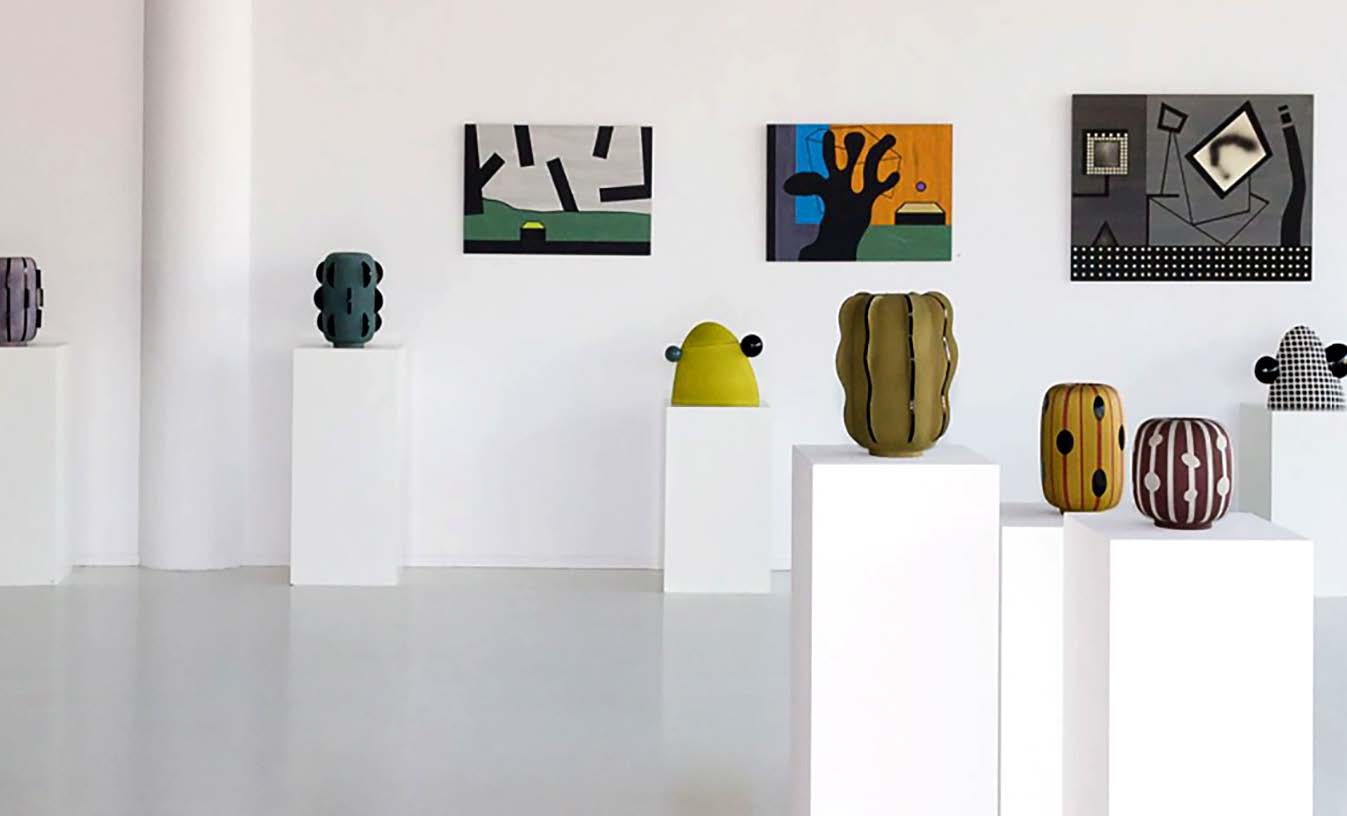
Exhibition“ Connection” (Larvik Art Association, 2014) by Che’s mother-in-law and father-in-law. Local artists, wife Elisabeth von Krogh works with ceramic media and husband Tore Aarholt creates collages
Unexpected Choices
Like her return to China, Che’s decision to leave the country almost 20 years ago surprised her family and friends who felt she was not fully prepared for such a big decision. However, Che said that she prefers to focus on the most important factors with her best efforts and “let nature run its course and explore possibilities.” She recalled that it was through the exchange program that she was able to go to Norway for the first time and enjoy an internship at one of its modern farms, a rare chance in the 1990s for Chinese students of agricultural engineering.
Che’s internship eventually led to an encounter with a BI professor. “A friend of the farm owner, he was very interested in China and asked whether I would like to pursue further education at the business school,” said Che. “I love math and like to deal with numbers,” she added, explaining her swift shift to finance.
Yet, Che’s initial excitement gradually faded as reality set in. Che recalled, “With zero finance background and language barriers, the first semester at BI was quite challenging.” She would stay late at the school library and study while commuting to campus by train. “I really appreciated this experience that made me strong, although it was not pleasant at that time.”
Life was much better after the challenging first semester. Che took opportunities to explore all of Western Europe and some of the Eastern European countries. She said, “Exploring different cultures results in growing your curiosity about the world and more interest in discovering the unknown.”
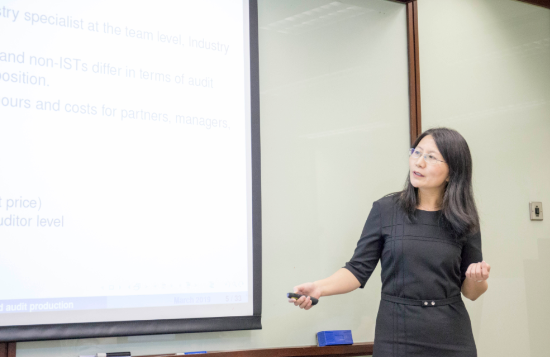
Che presents at an academic seminar at Hong Kong Polytechnic University
Today, with research interests in accounting, auditing, behavioral finance, and empirical asset pricing, Che has published papers in well-recognized international journals. One of her recently published papers “How Big-4 Firms Improve Auditing Quality,” used a novel research design to examine the Big-4 effect. “More important, this paper is the first to investigate the channels that Big-4 firms utilize to improve audit quality: the ability to recruit high-quality partners, sophisticated training, and stronger incentives/monitoring.”
Another recently published paper examines the impact of corruption on the accounting quality of municipal-level listed firms in China, which provides direct evidence of the brighter aspects of the fight against corruption in accounting. “This could be applied to many other countries, especially emerging markets,” she said.
Che credits PHBS’s favorable environment for cooperation, explaining that because PHBS differs from other schools by not having a department system, it encourages faculty from different fields to collaborate. “It really feels like a big family.”
Apart from research, Che teaches financial accounting and managerial accounting and said that she spent a lot time preparing the courses. “Our students are really bright, with very strong and solid academic backgrounds,” she noted. Due to the impact of COVID-19 during the spring 2020 semester, Che could only offer students online, live-streamed courses with slides and other teaching materials. Although there were challenges associated with online courses, she noted that “the remote teaching surprisingly led to more student participation since some may be more active online (via text messages) than in the classroom, and I have received positive feedback."
Nature and Culture
Academics were not Che’s only interest when considering moving to Shenzhen. “I also want my family to learn Chinese and experience Chinese culture.” Citing the city’s “nice climate and environment,” she said that life in Norway turned her into a nature lover who enjoys strolling in the forest and along the seaside. “Shenzhen has a lot of city parks, and it’s only a 15-minute walk from my apartment to nearby mountains.” However, Che admitted that Shenzhen is a bit too warm, although she enjoys the sunshine here.
Norway provided a life packed with natural wonders and uniquely Scandinavian arts. “Relaxing and colorful is probably what I’d like to use to describe the life in Norway,” said Che, adding that Norwegians enjoy good work/life balance. Che could spend quality time with family and friends in museums or outdoors.
“You have everything from majestic mountains to waterfalls, glaciers, and green hillsides.” In addition, she shared an example of Norwegian culture. “I love the family bonding and cultural traditions there. People often wear hand-made traditional costumes for various celebrations like weddings and Christmas, and passed on those costumes for generations.”
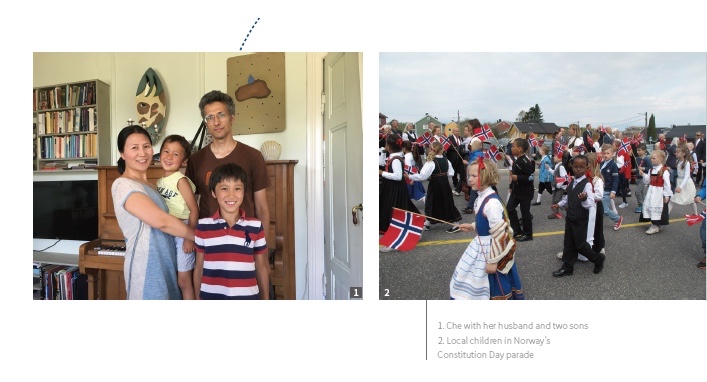
Intercultural Experience
When talking about striking a new balance between life and work, Che said, “My family needs more of my attention and help than before.” With two school-age boys, she needed to help them get adapted to life in China. Like most foreigners living here, her sons face a common string of issues: language barriers, educational differences, and interpersonal relationships.
“We chose to homeschool our 11-year-old for the first semester last year and planned to get him into an international school here. With the outbreak of the pandemic, my son needed to take online courses from his first school day in February,” said Che, adding that he missed his friends in Norway due to limited contact with normal life in China and classmates at school. “My 6-year-old is outgoing and gets along well with his peers at the kindergarten.” Luckily, since Che’s husband is working on entrepreneurial projects, “he has more flexible time to stay with kids.”
One interesting aspect of Che’s multicultural life is that she has to switch between Norwegian, English and Chinese. “We often speak Norwegian at home, because my little son is more used to speaking Norwegian. So, I mix speaking English with the older boy and Chinese with the little boy. I am often surprised how well my younger son’s Chinese has improved over time.”
Che said that she found “there is good social security and more opportunities here in Shenzhen.” Before her family moved here, they watched videos about Shenzhen made by foreigners. She encourages foreigners to experience Chinese culture and to know more about the fast-growing country. “I sometimes get lost with emerging new cyber words and concepts.” Che smiled, “I have to learn more Chinese too.”
For those who want to study or work abroad, Che cited her experience, saying that “to explore and discover the unknown makes life interesting and exciting, and it is much easier to do so when you are young. I am glad that I am always curious and open-minded. ”
By Annie Jin
From PHBS Magazine ( Fall 2020 )








